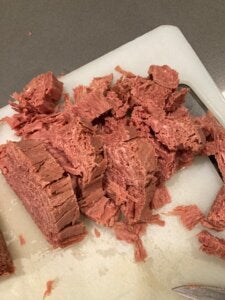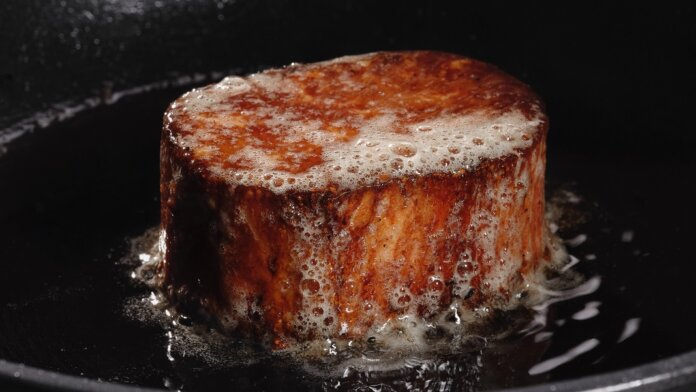From burgers to sausages and steak tips to chicken nuggets, there’s no shortage of plant-based “meat” products on grocery store shelves and in restaurants these days. Companies like Beyond Meat and Impossible Foods have done an impressive job diversifying their offerings, with almost any processed meat you can think of now on their lists (even beef jerky and popcorn chicken). But a key cut of meat is still missing from these big names’ menus: a good old-fashioned filet, just like the cows make ‘em.
A lesser-known player in the industry has been working to fill this gap. Slovenian startup Juicy Marbles was co-founded in early 2021 by Y Combinator alums Luka Sincek, Tilen Travnik, and Maj Hrova. The company launched its first product, a thick-cut filet mignon, in early 2022, and more recently started selling a whole-cut loin as well.
I received a whole-cut loin to sample; it arrived on dry ice, uncooked, and I was instructed to freeze or cook it within ten days. As a lifelong and unrepenting carnivore, I was wary but curious. It looked like meat: light red, fibrous, slightly moist. It felt like meat: dense, not overly pliable, requiring some pressure to slice through. But how was it going to taste?
Vegan Venture

I cut the steak into one-inch-thick slices and seasoned them with salt, pepper, paprika, and garlic powder, then pan-fried them in a little bit of vegetable oil for four minutes on each side. Upon flipping them over I was surprised to see that the edges had browned, much like real meat does.
I served the steak with quinoa and sauteed veggies, and after a few bites, I couldn’t deny it was both tasty and had a pleasant texture. Did it taste or feel like a real steak? Not really. The real meat it most reminded me of was rib meat, the kind that easily pulls off the bone when the ribs have been slow-cooked; soft and tender, but not dried out. The plant-based steak had a distinctly fatty-like mouthfeel without the excessive oiliness you sometimes get from animal fat.
Marbling Mystery
Achieving this texture, and a realistic “marbling” effect, has been one of the biggest challenges for plant-based meat companies. How do you replicate—with plants—animal tissue that has thin ribbons of fat running through it?
Though they can’t reveal too many details of their proprietary technology, Juicy Marbles has disclosed that unlike many plant-based meat companies, they don’t use 3D printing in their production process. Rather, they use a grinder they call the Meat-O-Matic 9000, which layers plant protein fibers on top of each other in a way that resembles muscle fibers. Deposits of hardened sunflower oil help add a realistic fat marbling texture and mouthfeel.
“Our business is based around the concept of protein texture—this is the defining factor that draws people to steak, when compared to a cheaper cut,” the company told TechCrunch. “In the plant-based meat vertical, there has not been as much innovation in the whole cuts space, and no one has come close to inventing a steak that resembles anything high-end.”
Health Highlights
The first few ingredients listed on the whole-cut loin package are plant structure (70 percent, made up of water, soy protein concentrate, and wheat protein isolate), sunflower oil, natural flavors, beetroot powder, and thickener. In terms of nutritional value, a four-ounce serving has 200 calories, 8 grams of fat, 7 grams of dietary fiber, no cholesterol, and 26 grams of protein.
A three-ounce filet mignon has 227 calories, 15 grams of fat, 6 grams of saturated fat, 82 milligrams of cholesterol, and 22 grams of protein. So the plant-based meat and the real meat are comparable in terms of some key parts of our daily diet.

One motivator for carnivores to go plant-based is the healthier profile of vegan meat. Juicy Marbles’ filet mignon got some press a little under a year ago when Lizzo posted a video to TikTok of herself cooking the filet with vegan eggs for breakfast, proclaiming after taking a bite, “It’s good!”
Though I enjoyed the steak and think it’s a high-quality product, I’m not certain I’d purchase it and regularly incorporate it into my meals, even if its price substantially undercut real steak. The problem with plant-based meat (and really any plant-based or vegan product that imitates an animal product, from eggs to milk to bacon) is that people who like the real thing aren’t likely to switch over to an imitation of the real thing, no matter how good it is. If I want meat, a plant-based approximation isn’t going to cut it.
Meanwhile, people who’ve made the choice to exclude meat from their diets may not be looking for a protein source that tastes and feels like meat.
Vladimir Mićković, Juicy Marbles’ Chief Business Officer, doesn’t feel that the company needs to target meat-eaters nor vegetarians. “It feels limiting to see people merely through the lens of their diet, so we don’t like to put them in such groups at all,” he told me in an email. “It doesn’t matter what diet our customers may follow, their taste buds and bodies will be the final judge.”
Food of the Future?
Could plant-based meat make a difference for the environment in terms of water, land, and emissions? Sure—but it would need to be adopted on a massive scale, and that could take a while; the industry has seen some fluctuation, with fast food giants like Burger King, McDonald’s, and Kentucky Fried Chicken jumping on the bandwagon over the last three years, but plant-based meat more recently being called a fad and a flop as companies like Beyond Meat and Impossible Foods see declining sales.
If consumers didn’t have some amount of appetite for meat substitutes, though, we wouldn’t be seeing more of them appear on the market, so there must be something to the plant-based movement. And it’s undeniable that the way we produce meat needs to change.
It seems it’s still too early to say whether plant-based meat is a short-term fad or a long-term fix. But in the meantime, if you’re looking for a meat-like protein to add to your meal while keeping it vegan, Juicy Marbles steak is worth a try.
Mićković believes the product has endless possibilities. “I just adore it with bordelaise sauce, but most commonly, I like to cut it into strips and combine it with unusual flavors like chermoula, maple, fruit, or new spices,” he said. “The question we love to answer in the kitchen is, “Ok, hear me out, what if we…”
Image Credit: Juicy Marbles



